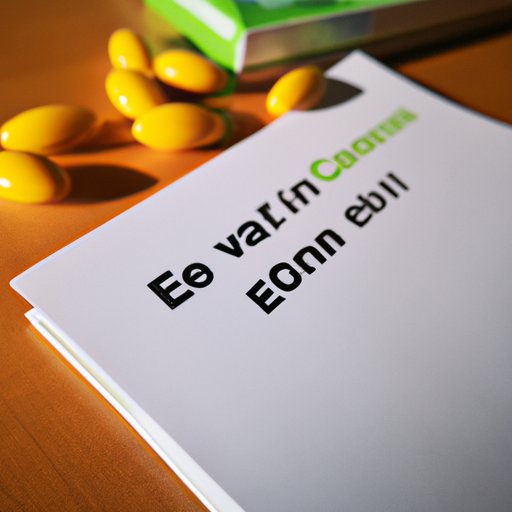
Introduction
Vitamin E is a fat-soluble micronutrient that plays an essential role in maintaining cell function in the body. It is responsible for preventing oxidative stress by neutralizing free radicals and promoting healthy immune function.
Despite the many benefits of vitamin E consumption, there are common misconceptions about the safe intake levels of this micronutrient. In this article, we will provide you with a comprehensive guide to understanding the risks and benefits of vitamin E, how to avoid overdose, and the recommended intake levels for optimal health.
The Benefits and Risks of Vitamin E: A Comprehensive Guide
Vitamin E is a group of eight different molecules, each with varying levels of biological activity that serve different purposes in the body. The two primary forms of vitamin E are alpha-tocopherol, which is commonly found in foods and supplements, and gamma-tocopherol, which is less abundant but has been shown to have powerful antioxidant properties.
Consuming vitamin E has many documented benefits, including its ability to reduce inflammation and oxidative stress, lower cancer risk, and improve heart health. However, taking too much vitamin E can lead to negative side effects such as blood thinning and impaired bone health.
Overdosing on Vitamin E: What It Does To Your Body And How To Avoid It
Excessive consumption of vitamin E can lead to overdose, which can have serious health consequences. When consumed in higher doses, it interferes with blood clotting, leading to excessive bleeding and a risk of hemorrhage.
Symptoms of vitamin E overdose may include gastrointestinal problems, vision changes, fatigue, and impaired immunity. However, these symptoms are relatively rare and usually occur only after consuming large amounts of the nutrient for a prolonged period.
To avoid overdose, individuals should take vitamin E-containing supplements only as directed by a healthcare professional and be aware of the amounts of vitamin E in their diet and supplements. Reading labels and consulting with a healthcare professional before supplementing is important to avoid risk.
The Dangers Of Consuming Too Much Vitamin E: Symptoms And Treatment
If someone suspects an overdose of vitamin E has occurred, a healthcare professional will diagnose it through laboratory tests and medical examinations. Treatment for vitamin E overdose typically involves discontinuing vitamin E supplements and seeking immediate medical attention if necessary.
In addition to the immediate risks of overdose, excessive vitamin E consumption over time can cause serious health effects later in life. Long-term overdosing can lead to stroke, heart attack, bone loss, and other chronic health issues.
The Importance of Proper Dosage: Understanding The Recommended Intake Of Vitamin E
The recommended intake of vitamin E for individuals varies based on several factors, including age, gender, health status, and diet. The current guidelines for daily vitamin E intake are dependent on the source of the vitamin, with food sources providing lower doses than supplements.
Healthy food sources of vitamin E include nuts, seeds, leafy greens, whole grains, and fortified foods. Supplementation should be approached holistically, with an understanding of how much vitamin E an average diet already contains before enhancing it with supplements.
Vitamin E: How Much is Too Much? Exploring Common Misconceptions and Potential Risks
The potential risks and benefits of vitamin E are often subject to confusion, with many misconceptions surrounding the dosage and consequences of overdose. It is critical to seek reliable information and evidence-based recommendations on how to consume vitamin E safely and in moderation effectively.
Proper dosage is critical to avoid health risks associated with overdose and to reap the health benefits associated with the nutrient.
Conclusion
Vitamin E consumption is an essential aspect of maintaining a healthy diet and lifestyle. Its role in regulating oxidative stress, promoting healthy immune system function, and reducing inflammation makes it a critical nutrient for overall health.
However, the potential risks of overdosing from vitamin E, especially among those who take supplements, should not be ignored. To ensure you stay safe and healthy while consuming this essential vitamin, consult with a healthcare professional, and stay informed about its potential risks and benefits.
Adopting a mindful approach to vitamin E intake that incorporates responsible usage and the guidance of a healthcare professional will enable you to receive the full benefits of this essential nutrient without the health risks associated with overdosing.




